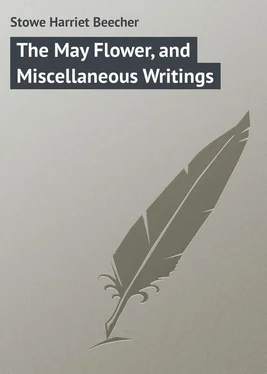Harriet Stowe - The May Flower, and Miscellaneous Writings
Здесь есть возможность читать онлайн «Harriet Stowe - The May Flower, and Miscellaneous Writings» — ознакомительный отрывок электронной книги совершенно бесплатно, а после прочтения отрывка купить полную версию. В некоторых случаях можно слушать аудио, скачать через торрент в формате fb2 и присутствует краткое содержание. Жанр: foreign_prose, на английском языке. Описание произведения, (предисловие) а так же отзывы посетителей доступны на портале библиотеки ЛибКат.
- Название:The May Flower, and Miscellaneous Writings
- Автор:
- Жанр:
- Год:неизвестен
- ISBN:нет данных
- Рейтинг книги:4 / 5. Голосов: 1
-
Избранное:Добавить в избранное
- Отзывы:
-
Ваша оценка:
- 80
- 1
- 2
- 3
- 4
- 5
The May Flower, and Miscellaneous Writings: краткое содержание, описание и аннотация
Предлагаем к чтению аннотацию, описание, краткое содержание или предисловие (зависит от того, что написал сам автор книги «The May Flower, and Miscellaneous Writings»). Если вы не нашли необходимую информацию о книге — напишите в комментариях, мы постараемся отыскать её.
The May Flower, and Miscellaneous Writings — читать онлайн ознакомительный отрывок
Ниже представлен текст книги, разбитый по страницам. Система сохранения места последней прочитанной страницы, позволяет с удобством читать онлайн бесплатно книгу «The May Flower, and Miscellaneous Writings», без необходимости каждый раз заново искать на чём Вы остановились. Поставьте закладку, и сможете в любой момент перейти на страницу, на которой закончили чтение.
Интервал:
Закладка:
Master James, at the time of his transit to the town of Newbury, was only eighteen years of age; so that it was difficult to say which predominated in him most, the boy or the man. The belief that he could, and the determination that he would, be something in the world had caused him to abandon his home, and, with all his worldly effects tied in a blue cotton pocket handkerchief, to proceed to seek his fortune in Newbury. And never did stranger in Yankee village rise to promotion with more unparalleled rapidity, or boast a greater plurality of employment. He figured as schoolmaster all the week, and as chorister on Sundays, and taught singing and reading in the evenings, besides studying Latin and Greek with the minister, nobody knew when; thus fitting for college, while he seemed to be doing every thing else in the world besides.
James understood every art and craft of popularity, and made himself mightily at home in all the chimney corners of the region round about; knew the geography of every body's cider barrel and apple bin, helping himself and every one else therefrom with all bountifulness; rejoicing in the good things of this life, devouring the old ladies' doughnuts and pumpkin pies with most flattering appetite, and appearing equally to relish every body and thing that came in his way.
The degree and versatility of his acquirements were truly wonderful. He knew all about arithmetic and history, and all about catching squirrels and planting corn; made poetry and hoe handles with equal celerity; wound yarn and took out grease spots for old ladies, and made nosegays and knickknacks for young ones; caught trout Saturday afternoons, and discussed doctrines on Sundays, with equal adroitness and effect. In short, Mr. James moved on through the place
"Victorious,
Happy and glorious,"
welcomed and privileged by every body in every place; and when he had told his last ghost story, and fairly flourished himself out of doors at the close of a long winter's evening, you might see the hard face of the good man of the house still phosphorescent with his departing radiance, and hear him exclaim, in a paroxysm of admiration, that "Jemeses talk re'ely did beat all; that he was sartainly most a miraculous cre'tur!"
It was wonderfully contrary to the buoyant activity of Master James's mind to keep a school. He had, moreover, so much of the boy and the rogue in his composition, that he could not be strict with the iniquities of the curly pates under his charge; and when he saw how determinately every little heart was boiling over with mischief and motion, he felt in his soul more disposed to join in and help them to a frolic than to lay justice to the line, as was meet. This would have made a sad case, had it not been that the activity of the master's mind communicated itself to his charge, just as the reaction of one brisk little spring will fill a manufactory with motion; so that there was more of an impulse towards study in the golden, good-natured day of James Benton than in the time of all that went before or came after him.
But when "school was out," James's spirits foamed over as naturally as a tumbler of soda water, and he could jump over benches and burst out of doors with as much rapture as the veriest little elf in his company. Then you might have seen him stepping homeward with a most felicitous expression of countenance, occasionally reaching his hand through the fence for a bunch of currants, or over it after a flower, or bursting into some back yard to help an old lady empty her wash tub, or stopping to pay his devoirs to Aunt This or Mistress That, for James well knew the importance of the "powers that be," and always kept the sunny side of the old ladies.
We shall not answer for James's general flirtations, which were sundry and manifold; for he had just the kindly heart that fell in love with every thing in feminine shape that came in his way, and if he had not been blessed with an equal facility in falling out again, we do not know what ever would have become of him. But at length he came into an abiding captivity, and it is quite time that he should; for, having devoted thus much space to the illustration of our hero, it is fit we should do something in behalf of our heroine; and, therefore, we must beg the reader's attention while we draw a diagram or two that will assist him in gaining a right idea of her.
Do you see yonder brown house, with its broad roof sloping almost to the ground on one side, and a great, unsupported, sun bonnet of a piazza shooting out over the front door? You must often have noticed it; you have seen its tall well sweep, relieved against the clear evening sky, or observed the feather beds and bolsters lounging out of its chamber windows on a still summer morning; you recollect its gate, that swung with a chain and a great stone; its pantry window, latticed with little brown slabs, and looking out upon a forest of bean poles. You remember the zephyrs that used to play among its pea brush, and shake the long tassels of its corn patch, and how vainly any zephyr might essay to perform similar flirtations with the considerate cabbages that were solemnly vegetating near by. Then there was the whole neighborhood of purple-leaved beets and feathery parsnips; there were the billows of gooseberry bushes rolled up by the fence, interspersed with rows of quince trees; and far off in one corner was one little patch, penuriously devoted to ornament, which flamed with marigolds, poppies, snappers, and four-o'clocks. Then there was a little box by itself with one rose geranium in it, which seemed to look around the garden as much like a stranger as a French dancing master in a Yankee meeting house.
That is the dwelling of Uncle Lot Griswold. Uncle Lot, as he was commonly called, had a character that a painter would sketch for its lights and contrasts rather than its symmetry. He was a chestnut burr, abounding with briers without and with substantial goodness within. He had the strong-grained practical sense, the calculating worldly wisdom of his class of people in New England; he had, too, a kindly heart; but all the strata of his character were crossed by a vein of surly petulance, that, half way between joke and earnest, colored every thing that he said and did.
If you asked a favor of Uncle Lot, he generally kept you arguing half an hour, to prove that you really needed it, and to tell you that he could not all the while be troubled with helping one body or another, all which time you might observe him regularly making his preparations to grant your request, and see, by an odd glimmer of his eye, that he was preparing to let you hear the "conclusion of the whole matter," which was, "Well, well – I guess – I'll go, on the hull – I 'spose I must, at least;" so off he would go and work while the day lasted, and then wind up with a farewell exhortation "not to be a callin' on your neighbors when you could get along without." If any of Uncle Lot's neighbors were in any trouble, he was always at hand to tell them that "they shouldn't a' done so;" that "it was strange they couldn't had more sense;" and then to close his exhortations by laboring more diligently than any to bring them out of their difficulties, groaning in spirit, meanwhile, that folks would make people so much trouble.
"Uncle Lot, father wants to know if you will lend him your hoe to-day," says a little boy, making his way across a cornfield.
"Why don't your father use his own hoe?"
"Ours is broke."
"Broke! How came it broke?"
"I broke it yesterday, trying to hit a squirrel."
"What business had you to be hittin' squirrels with a hoe? say!"
"But father wants to borrow yours."
"Why don't you have that mended? It's a great pester to have every body usin' a body's things."
"Well, I can borrow one some where else, I suppose," says the suppliant. After the boy has stumbled across the ploughed ground, and is fairly over the fence, Uncle Lot calls, —
Читать дальшеИнтервал:
Закладка:
Похожие книги на «The May Flower, and Miscellaneous Writings»
Представляем Вашему вниманию похожие книги на «The May Flower, and Miscellaneous Writings» списком для выбора. Мы отобрали схожую по названию и смыслу литературу в надежде предоставить читателям больше вариантов отыскать новые, интересные, ещё непрочитанные произведения.
Обсуждение, отзывы о книге «The May Flower, and Miscellaneous Writings» и просто собственные мнения читателей. Оставьте ваши комментарии, напишите, что Вы думаете о произведении, его смысле или главных героях. Укажите что конкретно понравилось, а что нет, и почему Вы так считаете.












